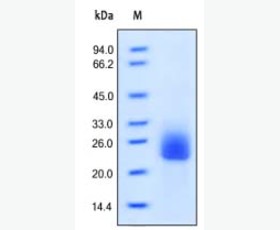Recombinant Human Apolipoprotein A1/ApoA1
| Product name: | Recombinant Human Apolipoprotein A1/ApoA1 |
| Source: | E. coli |
| Purity: | Greater than 95% as determined by reducing SDS-PAGE. |
| Buffer Formulation: | Lyophilized from a 0.2 μm filtered solution of 20mM PB, 150mM NaCl, pH 7.2. |
| Applications: | Applications:SDS-PAGE; WB; ELISA; IP. |
| Storage: | Avoid repeated freeze/thaw cycles. Store at 2-8 oC for one month. Aliquot and store at -80 oC for 12 months. |
| UOM: | 10ug/50ug/100ug/200ug/1mg |
| Source | E. coli |
| Description | Recombinant Human Apolipoprotein A-I is produced by our E.coli expression system and the target gene encoding Arg19-Gln267 is expressed with a 6His tag at the C-terminus. |
| Names | Apolipoprotein A-I, Apo-AI, ApoA-I, Apolipoprotein A1, APOA1 |
| Accession # | P02647 |
| Formulation | Lyophilized from a 0.2 μm filtered solution of 20mM PB, 150mM NaCl, pH 7.2. |
| Shipping |
The product is shipped at ambient temperature. |
| Reconstitution |
Always centrifuge tubes before opening. Do not mix by vortex or pipetting. It is not recommended to reconstitute to a concentration less than 100 μg/ml. Dissolve the lyophilized protein in ddH2O. Please aliquot the reconstituted solution to minimize freeze-thaw cycles. |
| Storage |
Lyophilized protein should be stored at < -20°C, though stable at room temperature for 3 weeks. Reconstituted protein solution can be stored at 4-7°C for 2-7 days. Aliquots of reconstituted samples are stable at < -20°C for 3 months. |
| Purity |
Greater than 95% as determined by reducing SDS-PAGE. |
| Endotoxin | Less than 0.1 ng/µg (1 IEU/µg) as determined by LAL test. |
| Amino Acid Sequence |
MRHFWQQDEPPQSPWDRVKDLATVYVDVLKDSGRDYVSQFEGSALGKQLNLKLLDNWDSVTSTFS KLREQLGPVTQEFWDNLEKETEGLRQEMSKDLEEVKAKVQPYLDDFQKKWQEEMELYRQKVEPLR AELQEGARQKLHELQEKLSPLGEEMRDRARAHVDALRTHLAPYSDELRQRLAARLEALKENGGAR LAEYHAKATEHLSTLSEKAKPALEDLRQGLLPVLESFKVSFLSALEEYTKKLNTQLEHHHHHH
|
| Background | Apolipoprotein A1 (APOA1) is a secreted protein which belongs to the Apolipoprotein A1/A4/E family. APOA1 is the major protein component of high density lipoprotein (HDL) in plasma. APOA1 plays a critical role in various biological processes, such as Cholesterol metabolism, Lipid metabolism and transport, Steroid metabolism. APOA1 promotes cholesterol efflux from tissues to the liver and thus helps to clear cholesterol from arteries. Defects in this gene resulted in HDL deficiencies, including Tangier disease (TGD), systemic non-neuropathic amyloidosis, premature coronary artery disease, hepatosplenomegaly and progressive muscle wasting and weakness. In addition, ApoA-I is implicated in the anti-endotoxin function of HDL via interaction with lipopolysaccharide or endotoxin. |














